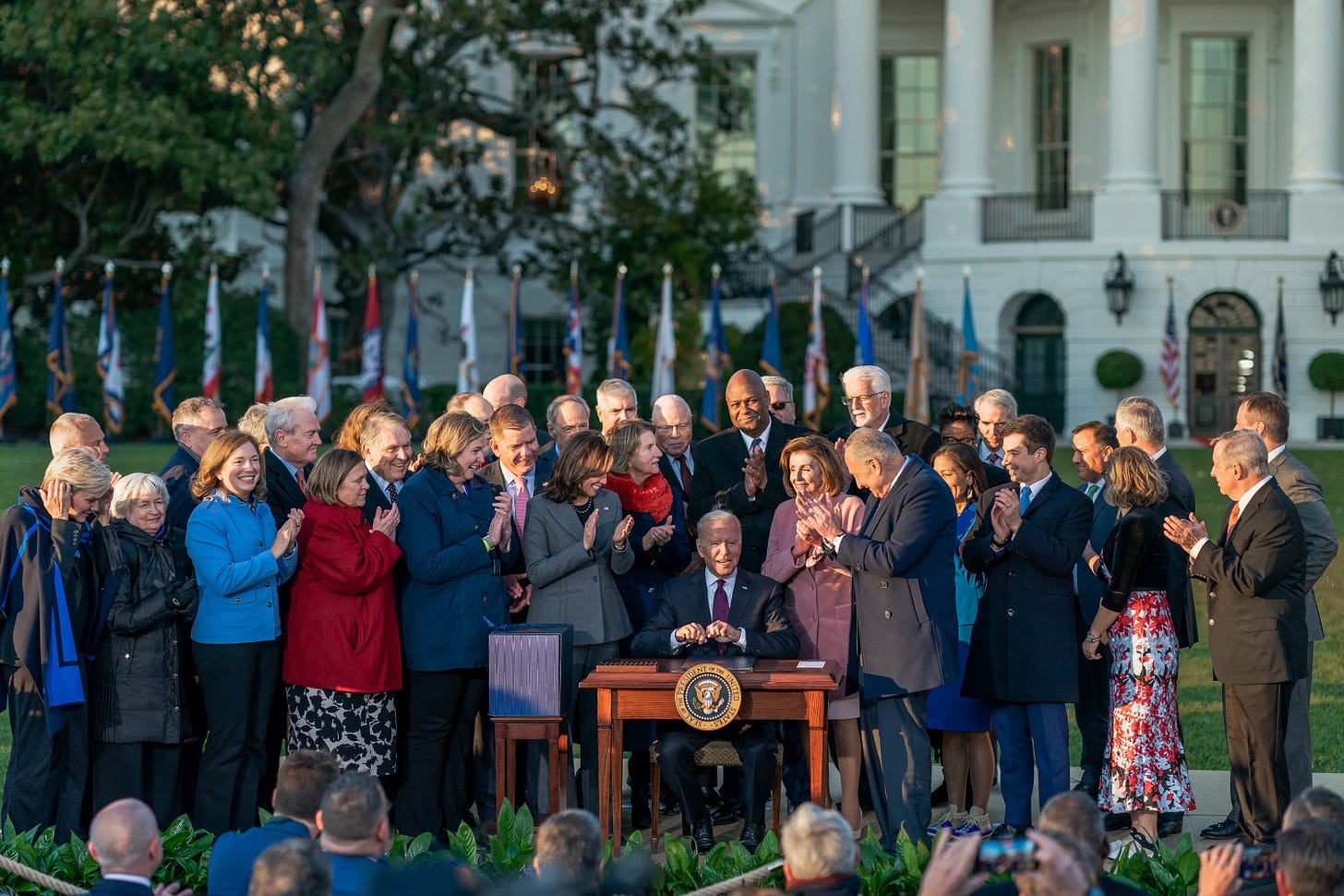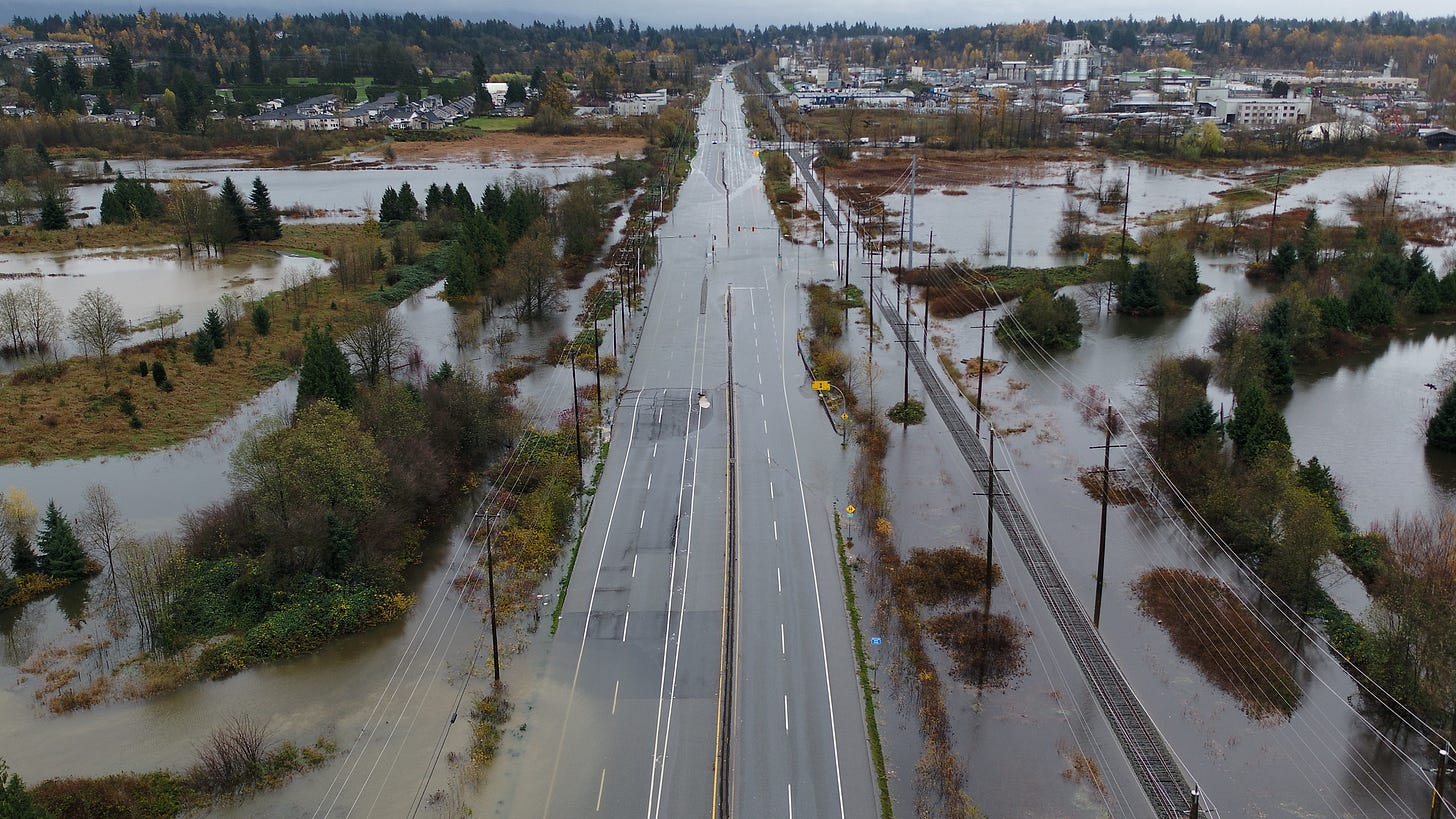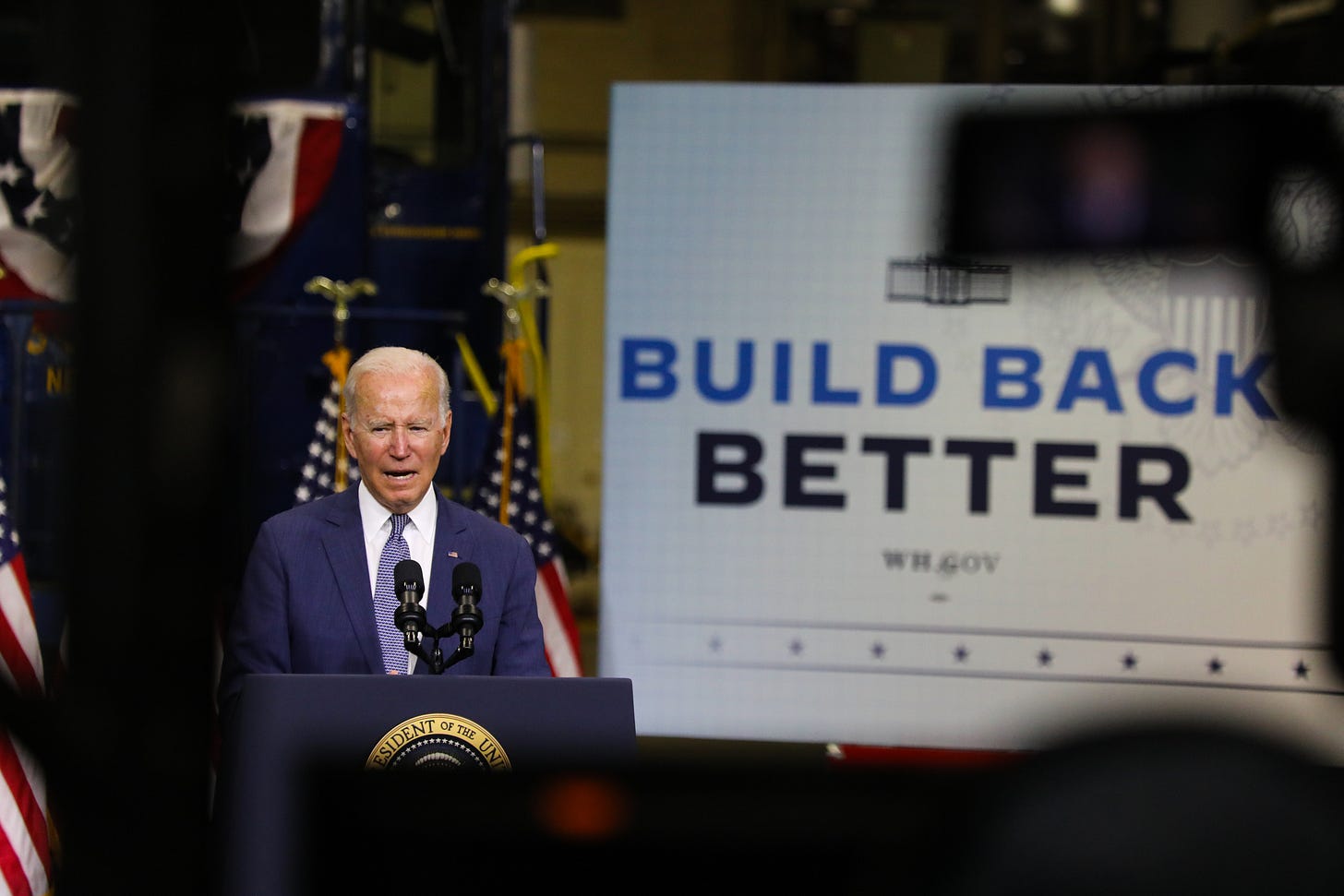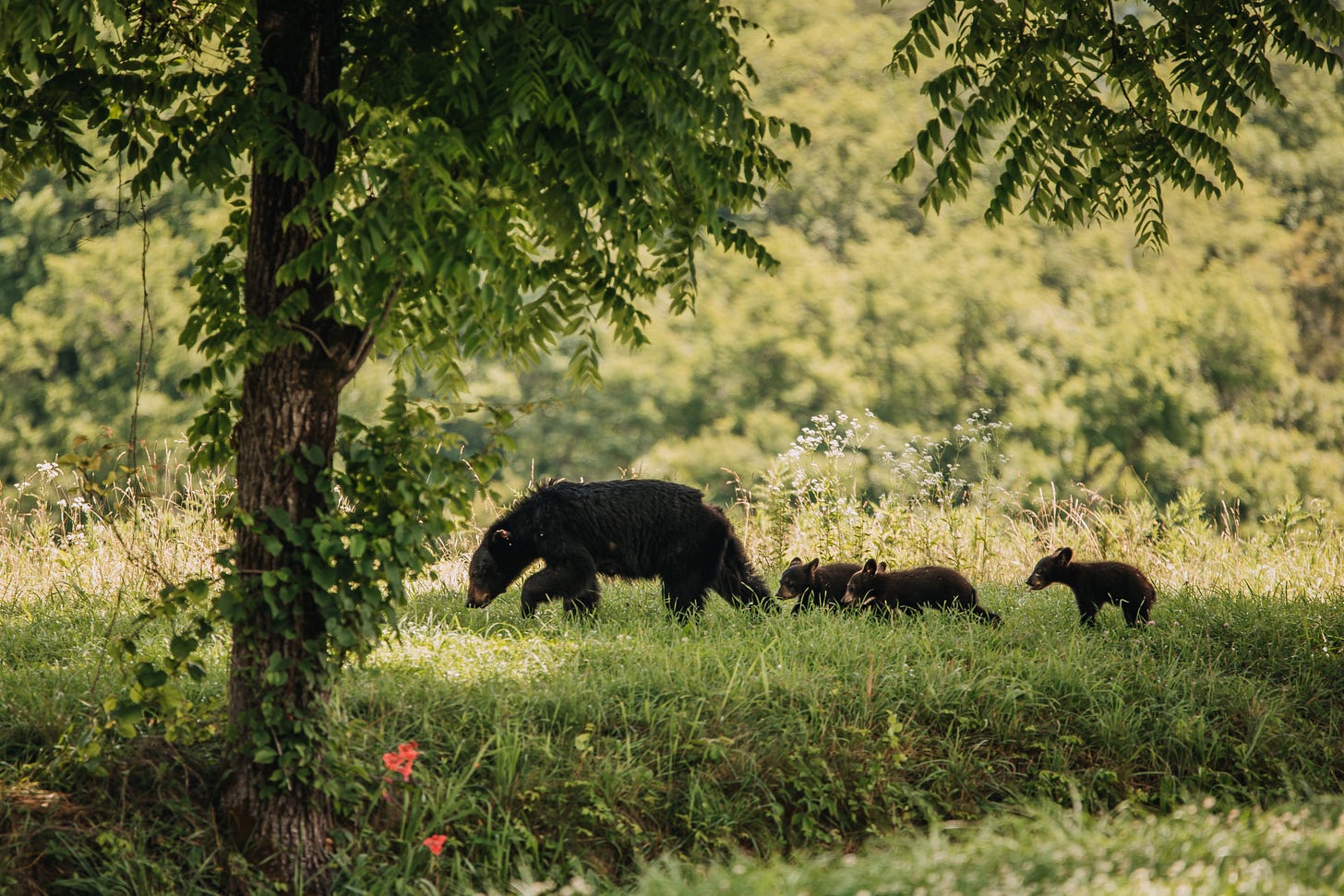Deadly floods soak Pacific Northwest, British Columbia
Plus, Biden's first big legislative win on climate.
Welcome to Planet Days, a five-minute roundup of the latest climate news and what it means for our Planet. If this was forwarded to you, smash that subscribe button:
First, some housekeeping: Sam and I will be taking off next week for Thanksgiving. If you’re really hankering for climate content, we’ll still be posting from our Twitter account, @PlanetDaysNews.
Or maybe just take a break and enjoy some family time! We’ll be back on December 6. Now, onto the last week of climate change news:

Monday, November 15
Biden signs the bipartisan infrastructure bill
President Joe Biden scored his first major legislative victory on climate when he signed into law the $1.2 billion Infrastructure Investment and Jobs Act. The bill contains $550 million in new spending, with some of that going to fight climate change and improve the environment, including:
$66 billion to improve Amtrak’s rail services
$65 billion to improve the power grid
$55 billion on water and wastewater infrastructure
$39 billion for public transit
$7.5 billion for electric vehicle charging stations
The law also invests in technology for capturing carbon and marks the nation’s largest investment in climate resilience. The Associated Press covers what’s in the law.
Shell moves to London
One of the biggest oil producers in the world made a splash last week. After 130 years in The Hague, Royal Dutch Shell announced its moving its headquarters to London and with it, will likely drop “Royal Dutch” from its name.
The move will let Shell simplify its structure, which is registered in the U.K. but headquartered in the Netherlands, while avoiding some Dutch taxes. The announcement comes as Shell faces pressure to reduce its carbon footprint: In May, a Dutch court ruled that Shell must cut emissions 45% by 2030 — though Shell said moving to London won’t affect that case. The Wall Street Journal has more.
Air pollution locks down Delhi
India’s largest city, New Delhi, is smothered by some of the Planet’s worst air pollution. It got so bad last week that authorities locked down the city, forcing tens of millions of people to work from home. The city also closed five power stations and canceled school, as the dirty air hospitalized more and more children, reports Reuters.
Meanwhile, in China, coal production reached six-year highs, as oil and gas prices spurred the country to move to dirtier but cheaper coal. The dilemma highlights the challenges of moving off fossil fuels while boosting economic growth.

Deadly floods soak Pacific Northwest, British Columbia
Torrential rains triggered floods and landslides as they moved through Washington state and southern British Columbia last week, leaving at least one person dead, three people missing, and hundreds of thousands without homes and power.
The storms, brought on by a cluster of atmospheric rivers, or deep streams of water vapor in the sky, broke at least 20 Canadian rainfall records and pushed Seattle closer to its wettest fall on record. One major landslide led to the rescue of nearly 300 people.
The deluge comes after a year of extreme heat, followed by record wildfires, all of which were made worse by climate change. As cleanups continue into the new week, more rain is still expected. The Washington Post has the latest.
Wednesday, November 17
After COP26, US opens Gulf for oil sale
Only days after COP26, the United States auctioned off more than 80 million acres of oil and gas leases in the Gulf, The Guardian reports. If burned, all this oil could emit nearly 600 million tons of emissions — more than a whole year of emissions in the United Kingdom.
Before you grab your pitchforks and torches, though, the Biden administration may not be to blame. The administration claimed its hands were tied by the courts, which ruled the sale must go on, despite Biden’s freeze of new oil and gas leases when he first took office.
The sale generated $192 million, with oil giants Exxon and Chevron among the top bidders. Exxon’s aggressive bids in shallow waters, however, may mean they’re following through on carbon-capture projects, with plans to store captured carbon in blocks they purchased, reports The Verge.
Friday, November 19
Brazil's hits highest deforestation spike in 15 years
The Amazon rainforest saw a 22% increase in deforestation last year, losing an area roughly the size of Connecticut and the largest amount of land since 2006.
Destruction of the Amazon has expanded under Brazil President Jair Bolsonaro, who has a shaky environmental record, to say the least. But recent studies have also linked the continued deforestation to food sold in Britain and American demand for leather.
Needless to say, actually protecting the region will take a global effort. Brazil is just one of over 100 nations that pledged to end deforestation by 2030 at this month’s COP26. BBC has more.

House passes largest U.S. climate bill
If the U.S. is going to hit its climate targets, the bipartisan infrastructure law won’t be enough. That’s where the Democrats' Build Back Better Act comes in. On Friday, House Democrats passed the sweeping social spending bill 220–213, largely along party lines.
The $1.9 trillion bill contains over $500 billion to fight climate change, including incentives to use clean energy or buy electric vehicles, the creation of a Civilian Climate Corps, and investments in clean energy technology and manufacturing. CNN has what’s in the bill.
The bill now faces an uphill battle in the Senate. Sen. Joe Manchin (WV-D), who has already scuttled several climate provisions in the bill, is now attacking an electric vehicle tax credit. For the bill to pass, Democrats need all 50 senators on board.
Bonus
What about the animals' infrastructure bill?
Biden’s most recent infrastructure win does a good amount for people and the Planet. But it also allocates $350 million to help America’s wildlife safely cross the road. Around 12% of North American wild mammals die on roads and are often discouraged from trying “to get to the other side,” a phenomenon that affects migration and mating.
The provision, though only a small part of the bill, is the nation’s largest investment in wildlife crossings and will go toward animal-friendly bridges, underpasses, and roadside fences. Vox has the full story.
Happy Thanksgiving!
Brandon and Sam





